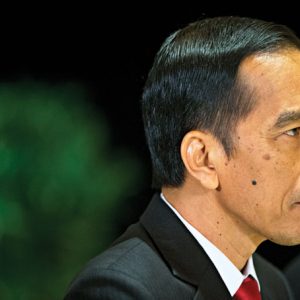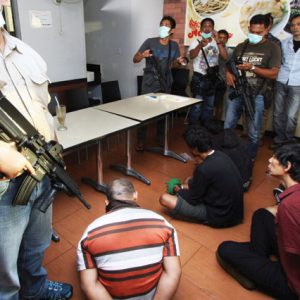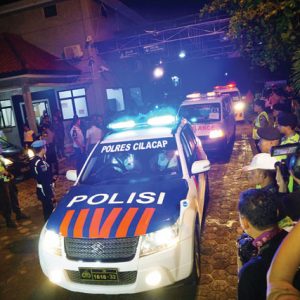Indonesia’s president is seen by many as a symbol of hope for human rights, so why is he firmly behind the death penalty for drug offences?
By Daniel Besant
“There will be no clemency for convicts who committed narcotics-related crimes,” said Indonesia’s newly elected president, Joko ‘Jokowi’ Widodo, at a Yogyakarta university in December. “There are between 40 and 50 Indonesians, mostly young people, who lose their lives every day due to drug use.”

And so, Indonesia’s seventh president, a man who symbolised and synthesised hope for millions, who presented himself as a champion of human rights and the everyman during his election campaign, condemned 64 people to a bloody execution by firing squad.
On January 18, death sentences were carried out on two women and four men from Brazil, the Netherlands, Vietnam, Malawi and Nigeria. So why did Jokowi make this decision?
For one, during his election campaign, Jokowi was often criticised for not being ‘firm’ and ‘decisive’ like his rival, Prabowo Subianto.
“With Jokowi’s administration, the death penalty is used as a political tool to show that it is tough on offenders,” said Ricky Gunawan, director of LBH Masyarakat (Community Legal Aid Institute), based in Jakarta. “When you get a new administration, executions are carried out… It’s an easy way for Jokowi to raise his profile.”
Indonesia is dominated by an anti-drugs agenda promoted by certain civil society groups. This agenda is then followed by a media that prints stories offering blanket condemnation of illegal drugs and their use without differentiating between users, drug mules and serious criminals.
Indonesia’s prosecutors see drug offences as an “extraordinary crime”, justifying this stance by saying that drugs kill people, said Gloria Lai, senior policy officer at the International Drug Policy Consortium. “If people are dying from drugs then that’s a health problem that needs to be met with health measures,” she said. “It is entirely out of proportion to be killing people.”
It is unclear why drugs are targeted as being the biggest threat. Cigarettes and alcohol kill people as well, but those that sell them are not arrested, prosecuted and singled out for the death penalty.
“President Jokowi and the Indonesian public must accept that drug trafficking is not a lethal crime,” said Patrick Tibke, a recent graduate of the Southeast Asian studies programme at the School of Oriental and African Studies, University of London. “Drug traffickers do not intend to kill their patrons, in the same way that tobacco companies do not intend to kill cigarette smokers. This is precisely what distinguishes a murder from an accident: premeditated lethal intent.”

Out on the streets, the country’s National Narcotics Agency, or BNN, follows the hardline ‘war on drugs’ model that is losing credibility and support in many parts of the world, particularly South America. In Indonesia, however, this approach receives praise in the media and from civil society. In turn, the media and some civil society groups put pressure on the government to carry out the death penalty for those convicted of drug offences.
According to Gunawan, police have unofficial quotas for arrests of drug suspects. Arrests can be seen as an award, an achievement, so police will do what they can to find and arrest drug offenders, even if that involves fabricating evidence. Furthermore, the legal definitions of drug crimes are wide. For example, if somebody’s car is used for the transportation of drugs without their knowledge, they may still be arrested, charged and convicted of trafficking drugs.
“Indonesian law is very loose in its interpretation of the criminal provision. It’s easy for officials to use this to make arrests of those involved in the distribution of drugs – even very small amounts, or even people who have unwittingly been involved,” said Gunawan.
Furthermore, the use of the death penalty remains overwhelmingly popular in Indonesia. “The vast majority of the Indonesian public still supports the use of the death penalty, particularly for those convicted of drug offences,” said Tibke. “Media polls typically show about 75% support for executing drug traffickers and convicted terrorists, and about 70% support for executing government officials convicted of large-scale corruption.”
However popular the death penalty may be, the legal basis for carrying out a death sentence – by tying a prisoner to a wooden cross and shooting them – simply does not exist for drug offences in Indonesia. The country ratified the International Covenant on Civil and Political Rights in 2005. Article 6 of the covenant states that, for countries that have not yet abolished the death penalty, it may only impose it for “the most serious crimes”. No fewer than four UN bodies have consistently maintained that drug offences should not be considered serious crimes and, in March 2014, the International Narcotics Control Board encouraged states to abolish the death penalty for drug-related offences. Indonesia is a member of this board.

“There is no legal basis for imposing the death penalty,” said Lai. “It’s a human rights violation and there is no effectiveness in carrying it out. The justification is that it will ‘stop drugs’ and scare people into not bringing drugs into the country. All the figures we have show that the availability of drugs is increasing.”
Budding Walter Whites and Pablo Escobars are pumping ever more narcotics into Indonesia because illegal drugs become more valuable when users and dealers are threatened with harsher punishments.
“President Jokowi should be aware that applying harsh penalties for drug offences generally has a counterproductive effect on drug markets. This effect is known as the risk premium: the greater the risk to a would-be trafficker, the greater the risk premium he may charge to his client,” said Tibke. “The death penalty gives an incentive for more cooks to start cooking and more dealers to start dealing. Surely this is not the ‘deterrent’ effect that Jokowi is hoping for.”
However unrealistic Indonesia’s drug policies are, the situation is not without hope. Gunawan points out that Jokowi – despite the pressure from the media and civil society – is surrounded by advisors who care about human rights.
Gunawan also believes that, despite the prevailing anti-drugs environment, there are many politicians who have progressive attitudes towards drugs, although “it’s rare that they will air those opinions and defend that position in public”.
Lai also sees cause for optimism. “We know that Indonesia is looking at changing the law to discriminate between those who use drugs and those who deal in drugs and traffic them in great quantities,” she said. “There are civil society groups who are working hard to make a change in Indonesia, to make society better, and the government seems quite open to working with these organisations and listening to them. I’m more optimistic with Indonesia than with other countries in the region.”
Globally, the tide may be turning in the war on drugs. Countries such as Portugal and the Netherlands have shown that introducing laws that decriminalise drugs is an effective way to reduce deaths from overdoses and HIV transmission among intravenous users. South American countries that want an end to the war on drugs have successfully applied pressure to bring forward a special session of the UN general assembly on the world drug problem from 2018 to June 2016.
Asked what needs to happen right now, Gunawan is clear. “Indonesia should move towards abolition, review all clemency applications carefully and implement steps towards abolition by bringing in a moratorium on the death penalty. And those on death row should have their sentences commuted to life,” he said.
“Ironically, President Jokowi wears his own lethal intent proudly on his sleeve and is sadistically applauded for it,” added Tibke, “while the drug traffickers he intends to kill are merely guilty of attempting to supply a substance to a consenting market.”
Keep reading:
“Minority report” – Indonesian politics has thrown up some surprises of late, not least the election of Jakarta’s new governor. Meet the Chinese Christian who will step into Joko Widodo’s rather sizeable shoes
